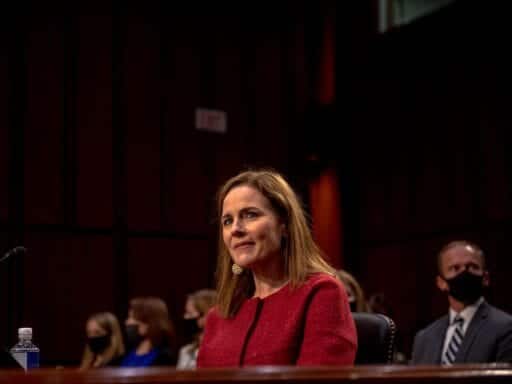Sen. Mazie Hirono confronted Barrett about her use of the term.
While discussing LGBTQ rights, Supreme Court nominee Amy Coney Barrett on Tuesday used a term that LGBTQ activists have called “offensive,” “outdated,” and a “dog whistle.”
“I have no agenda, and I do want to be clear that I have never discriminated on the basis of sexual preference and would not ever discriminate on the basis of sexual preference,” Barrett said, when asked about her stance on preserving protections for members of the LGBTQ community.
The term “sexual preference,” however, is an offensive one, which suggests that sexual orientation is a choice, Lambda Legal, a legal advocacy group, explained on Twitter.
IMPORTANT:
Barrett used “sexual preference” (not “sexual orientation”) when discussing her views on marriage equality.
This is a dogwhistle. The term “sexual preference” is used by opponents of equality to suggest that being #LGBTQ is a choice.#BlockBarrett #SCOTUSHearing pic.twitter.com/kkftq9l2l5
— Lambda Legal (@LambdaLegal) October 13, 2020
Rep. David Cicilline (D-RI) said the phrase was a “1970s term.” And Slate’s Mark Joseph Stern broke down why Barrett’s use of it was so concerning:
As Jesse Bering explained in 2013, the term is similar to other expressions, like “the gay lifestyle” or “avowed homosexual,” that were once common but are now considered offensive. These phrases play into the anti-gay canard that sexual minorities are not a discrete and insular minority deserving of constitutional protections but rather deviants who should not be rewarded for their aberrant sexuality.
Sens. Mazie Hirono and Cory Booker later confronted Barrett about her statement, prompting her to apologize. “Sexual orientation is a key part of a person’s identity,” Hirono said.
The correct term is sexual orientation. “Sexual preference” is a term often used by anti-LGBTQ activists to imply that sexual orientation is a choice. https://t.co/rT6g95gsG1
— GLAAD (@glaad) October 13, 2020
Barrett’s apology, however, was also telling, signaling that she seemingly hadn’t even realized that she was using harmful language.
“I certainly didn’t mean and would never mean to use a term that would cause any offense in the LGBTQ community,” Barrett said. “So if I did, I greatly apologize for that. I simply meant to be referring to Obergefell’s holding with respect to same-sex marriage.”
Obergefell v. Hodges, the landmark Supreme Court case guaranteeing marriage equality, is among the precedents that Barrett declined to provide a position on, citing the need to maintain impartiality — an approach many nominees have taken in the past.
Her statement about “sexual preference,” however, revealed how out of touch Barrett appears to be in how she talks about LGBTQ rights, which she’d play a critical role in making judicial decisions about if she were to become a Supreme Court Justice.
Millions turn to Vox each month to understand what’s happening in the news, from the coronavirus crisis to a racial reckoning to what is, quite possibly, the most consequential presidential election of our lifetimes. Our mission has never been more vital than it is in this moment: to empower you through understanding. But our distinctive brand of explanatory journalism takes resources. Even when the economy and the news advertising market recovers, your support will be a critical part of sustaining our resource-intensive work. If you have already contributed, thank you. If you haven’t, please consider helping everyone make sense of an increasingly chaotic world: Contribute today from as little as $3.
Author: Li Zhou
Read More



